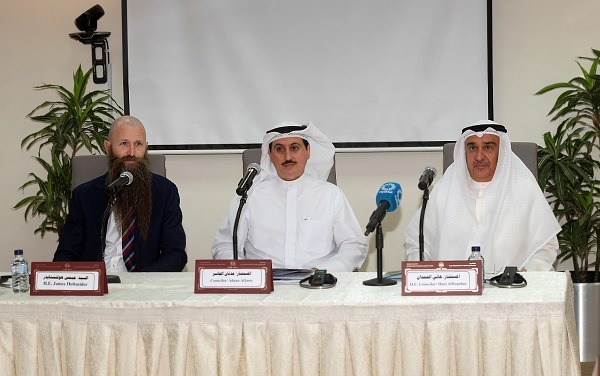The Kuwait Institute for Judicial and Legal Studies partnered with the Office of Assistance and Training for the Development of Public Prosecutions Abroad of the US Department of Justice to organize a collaborative training initiative titled “Judicial Principles and Their Application – A Judicial Conference.”
This event took place at the headquarters of the Kuwait Institute for Judicial and Legal Studies, with a substantial presence of Kuwaiti judges, their Saudi counterparts, Bahraini delegates, and three visiting judges from the United States. The Charge d’Affaires of the US Embassy in Kuwait James Holtsnider inaugurated the event.
In his opening address, James Holtsnider, elucidated the structure of the American legal system, emphasizing its three core sections — the Senate responsible for legislation, the executive branch implementing laws, and the judicial system, which closely aligns with Kuwait’s judicial framework, exemplified by its independence and the authority derived from the Constitution.
He expressed his gratitude to the judges taking part in the workshop, recognizing their efforts to bolster the rule of law in their respective countries, and highlighted the mutual learning opportunity presented by their collaboration.
Holtsnider praised the Kuwaiti judges for their professionalism and extensive experience, underscoring the value of continued collaboration between the two nations.
He outlined the primary objectives of the program, including knowledge exchange, judge training, and fostering stronger relationships among the four countries involved. Holtsnider emphasized the robust relationship between the United States and Kuwait, acknowledging the expertise and experience of judges from Bahrain and Saudi Arabia and stressed on the significance of collaboration with colleagues and friends to further enhance the practice of law.
Holtsnider went on to say, “At times, individuals ponder over the adaptability of legal systems across different nations and their collaborative potential. In the United States, we observe two distinct legal traditions. Louisiana, for instance, operates under the French legal tradition, while the other states follow the foundation of English common law. This divergence results in a rich array of perspectives and practices within the legal framework, presenting an opportunity for mutual learning.”
He added, “Although the legal systems may vary, this diversity doesn’t imply a direct translation of solutions. However, it consistently provides a chance to glean insights from one another. Occasionally, innovative resolutions can arise for intricate challenges. I am certain that our judges will gain valuable insights during this visit. Likewise, I believe and hope that our Kuwaiti, Bahraini, and Saudi colleagues will derive valuable information from the American judges.”
Speaking on the occasion, Counselor Hani Al-Hamdan, the Director of the Kuwait Institute for Judicial and Legal Studies, warmly welcomed “our esteemed guests from the Kingdom of Saudi Arabia and the Kingdom of Bahrain, extending wishes for a pleasant stay in Kuwait, their second home.”
He said, “This conference is designed to augment persistent endeavors in promulgating legal knowledge and exploring effective comparative experiences concerning legal issues. Their contributions will undoubtedly enrich our deliberations and foster a practical framework, bringing our judicial systems closer in perspective.”
In statements made during the workshop, Al-Hamdan responded to a question about the assessment of legal field cooperation with the states, stating, “There’s no doubt that our collaboration with the United States, represented by the American Embassy and the Office of Assistance and Development of Public Prosecutions Abroad, has been exceptionally fruitful. Past collaborations, including two conferences in the last year, were productive and enlightening, benefiting from the expertise of American judges who were engaged for this purpose.”
He went on to say, “In this instance, we have included judges from the Kingdom of Saudi Arabia and the Kingdom of Bahrain. This aligns with the Kuwait Institute for Judicial Studies’ ambition to be a regional training center in the Arabian Gulf region. Our collaboration with the American Embassy has culminated in organizing this conference at this opportune moment, featuring the participation of judges from Saudi Arabia and Bahrain.”
Al-Hamdan emphasized, “The United States possesses a profound legal and judicial cultural heritage, encompassing fundamental legal principles that are universally revered. These principles revolve around concepts of freedom, justice, and the equitable application of the law. Furthermore,” he said, “contemporary advancements in witnessing practices and the integration of artificial intelligence for testimony assessment and evidence evaluation will be key topics of discussion in this conference.”
Holtsnider also added saying, “Kuwait consistently has a significant presence of students pursuing their studies in the United States, and we are eager to welcome and support many of them for their graduate studies.”
He went on to say, “We already have a group of highly experienced Kuwaiti individuals who have traveled to the United States for their studies, particularly in the field of law. We warmly embrace the prospect of more Kuwaiti students continuing their legal education.”
He elaborated saying, “One example of such opportunities is pursuing an LLM, a continuing Master’s degree in legal studies. There’s already a notable number of proficient Kuwaiti judges who have pursued this program in the United States. However, we remain open to explore additional programs, and this will be a focal point of our discussion with the Kuwait Institute, aiming to enhance our collaboration further.”

